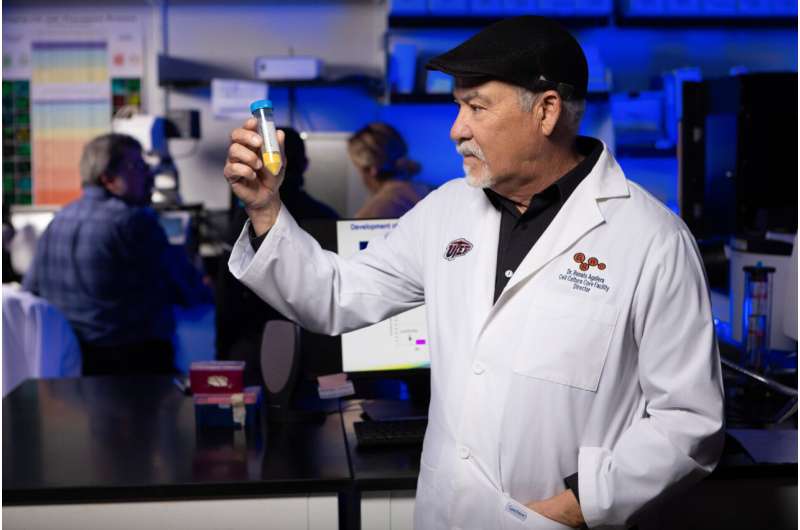Treatment Innovations
-
Facebook
-
Twitter
-
Linkedin
Innovations in cancer treatment are transforming patient care by introducing more precise, effective, and less invasive therapies. Immunotherapy, including checkpoint inhibitors and CAR-T cell therapy, has revolutionized cancer care by harnessing the immune system to target and destroy cancer cells.

Double trouble for tumors: Immunotherapy shows promise in prostate cancer treatment
Researchers at the University of Arizona Health Sciences have uncovered a promising new approach for treating prostate cancer through a combination of immunotherapy and a targeted treatment strategy.

Certain genetic alterations may contribute to primary resistance of certain cancers to KRAS G12C inhibitors
The KRAS G12C mutation is found in approximately 3% of all colorectal cancer cases and 1% to 2% of pancreatic adenocarcinoma cases, according to Hao Xie, MD, PhD, a medical oncologist at Mayo Clinic Comprehensive Cancer Center.

Aromatic Plant Found to Have Cancer-Fighting Properties Against Colorectal Cancer
Traditional Chinese medicine has used Artemisia annua, or sweet wormwood, for over 2,000 years to treat various ailments, including malaria and fever.

Study finds new potential for prostate cancer immunotherapy
A new study by University of Arizona Health Sciences researchers found that an immunotherapy previously shown to be ineffective against prostate cancer may have therapeutic potential when combined with a synergistic treatment approach. The paper was published in the journal Cancer Immunology Research.

Common malaria drug repurposed to fight cancer
Can a drug that’s used to treat malaria be repurposed to fight cancer? Researchers at The University of Texas at El Paso have secured a patent for the anti-malarial drug pyronaridine to do just that. Pyronaridine has been used to treat the mosquito-borne infectious disease for over 30 years.

Melatonin’s Anti-Cancer Potential; Prenatal PFAS and Cancer; Anti-Viral Gel for HPV
News, features, and commentary about cancer-related issues

New test may predict kidney cancer recurrence
Scientists at the University of Michigan have discovered a way to predict which kidney cancer patients are more likely to have their cancer come back after treatment. Their research could help doctors decide who needs extra treatment and who doesn’t, making care more personalized instead of using a “one-size-fits-all” approach.

Genetic testing offers hope for targeted childhood cancer therapies
New research has looked into a comprehensive and structured approach to genetic testing, matching children and young people with cancer to targeted treatments.

Could Salmonella Be the Key to Treating Bowel Cancer?
The concept of using bacteria to treat cancer dates back to the early 1800s, long before the advent of modern cancer treatments like chemotherapy or radiotherapy. Historical evidence suggests that rudimentary and crude forms of immunotherapy were practiced as early as Ancient Egypt. However, these early treatments of cancer using immunotherapy were risky and unreliable due to the lack of antibiotics and the potential for severe side effects.

Breast cancer drug Supinoxin shows potential for small-cell lung cancer in new tests
Purdue University scientists have identified the Supinoxin small-molecule drug as a possible new therapy for small-cell lung cancer (SCLC).

Cell-free RNA blood test identifies early-stage cancers, monitors treatment resistance and detects tissue damage
Stanford Medicine researchers have developed a blood test capable of detecting cancers, the ways cancer resists treatments and tissue injury caused by non-cancerous conditions.

Common painkiller might help stop cancer from spreading
Most cancer deaths happen not because of the main tumor, but because cancer cells spread to other parts of the body. This process is called metastasis. When cancer spreads, it becomes much harder to treat.

DNA origami offers more accurate imaging in the fight against pancreatic cancer
One of the challenges of fighting pancreatic cancer is finding ways to penetrate the organ’s dense tissue to define the margins between malignant and normal tissue

Himalayan fungus compound tweaked for 40x anti-cancer boost
By using a compound derived from a Himalayan fungus and used for centuries in Chinese medicine as a jumping off point, scientists have developed a new chemotherapy drug with powerful anti-cancer effects. Doing so involved chemically altering the compound to better infiltrate cancerous cells, which proved to boost its potency by up to 40 times.

How vitamin B3 could help fight cancer
Scientists from the University of Minnesota have found a new way to boost the body’s natural defenses against cancer.

Immunotherapy Could Replace Surgery for Certain Types of Cancer, New Study Finds
Results from a groundbreaking clinical trial could soon change the way certain types of cancers are treated.

New genetic code may be the key in understanding origins of ovarian cancer, new treatment options
ICHMOND, Va. (WRIC) — A group of scientists at Virginia Commonwealth University (VCU) may have the key to discovering cancer’s origins within the body, as well as insights into new treatment strategies for ovarian cancer.

Radioiodine therapy found to improve relative survival rates of differentiated thyroid cancer patients
Differentiated thyroid cancer patients who receive radioiodine (RAI) treatment after surgery have increased relative survival rates compared to those who do not receive the treatment.

Root cause of pancreatic cancer and new treatment
Pancreatic cancer is one of the deadliest forms of cancer. A specific type called pancreatic ductal adenocarcinoma, or PDAC, is especially aggressive. Right now, there are no truly effective treatments for this kind of cancer. Sadly, only about 8 out of every 100 people diagnosed with PDAC live longer than five years.

Scientists finds new treatment for lung cancer
Small-cell lung cancer (SCLC) is one of the most aggressive and deadly types of cancer, often linked to smoking.

The unseen team of medical detectives at Northwestern Medicine using advanced techniques for cancer detection, treatment
CHICAGO (WGN) — While machines can scan and surgeons cut, it takes a special kind of doctor to determine the presence of cancer in a patient.

A powerful drug combo may treat pancreatic cancer
Pancreatic cancer is one of the deadliest cancers in the world. Only about 13 out of every 100 people with this disease survive for five years after being diagnosed.

The Targeted Pulse: Discover the FDAÕs Holiday Moves For Solid Tumors, Gastric, and GEJ Cancers
The subcutaneous formulation of nivolumab (Opdivo Qvantig) received FDA approval for all previously approved adult solid tumor indications as monotherapy, maintenance therapy, or in combination with chemotherapy or cabozantinib (Cabometyx). Data from the phase 3 CheckMate-67T study (NCT04810078) provided support for this approval. In the trial, subcutaneous nivolumab was compared with its intravenous formulation.

China’s National Medical Products Administration (NMPA) Approves VYLOYª (zolbetuximab) for First-Line Treatment of Advanced Gastric or Gastroesophageal Junction Adenocarcinoma
OKYO, Jan. 5, 2025 /PRNewswire/ — Astellas Pharma Inc. (TSE:4503, President and CEO: Naoki Okamura, “Astellas”) today announced that China’s National Medical Products Administration (NMPA) has approved VYLOYª (zolbetuximab), in combination with fluoropyrimidine- and platinum-containing chemotherapy, for the first-line treatment of patients with locally advanced unresectable or metastatic human epidermal growth factor receptor 2 (HER2)-negative gastric or gastroesophageal junction (GEJ) adenocarcinoma whose tumors are claudin (CLDN) 18.2 positive.






